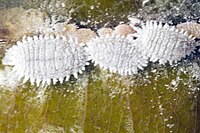
Photo from wikipedia
The Asian citrus psyllid, Diaphorina citri Kuwayama (Hemiptera: Liviidae), is the vector of the bacterium responsible for huanglongbing, a deadly plant disease affecting citrus worldwide. We investigated the effects of… Click to show full abstract
The Asian citrus psyllid, Diaphorina citri Kuwayama (Hemiptera: Liviidae), is the vector of the bacterium responsible for huanglongbing, a deadly plant disease affecting citrus worldwide. We investigated the effects of wind direction and speed on flight duration and direction of D. citri, as well as the effects of temperature and barometric pressure on sustained flight duration of D. citri. Experiments were performed with laboratory flight mills and wind tunnels. Flight activity of D. citri increased with increasing temperature. Of the few insects that flew at 18°C, most performed short duration flights (<60 s). When exposed to temperatures between 21 and 28°C, D. citri performed long duration flights (>60 s). In addition, the distance covered increased with temperature. Interestingly, males were more sensitive to cold temperature and flew significantly shorter distances than females at 21 and 25°C. Barometric pressure recorded before and during the flight mill experiment suggested that decreasing pressure reduced distance flown by D. citri. Flight direction was strongly influenced by wind. In wind tunnel experiments where psyllids were challenged to reach citrus leaf flush positioned either downwind or upwind, most D. citri moved downwind when exposed to continuous airflow. In a subsequent experiment, we challenged psyllids to pulsed wind blowing at higher speeds. In this case, most psyllids progressed upwind, suggesting upwind movement by psyllids during pauses within pulsed airflow. Collectively, the results indicate that D. citri are able to modify their flight behavior in response to abiotic factors.
Journal Title: Journal of economic entomology
Year Published: 2018
Link to full text (if available)
Share on Social Media: Sign Up to like & get
recommendations!